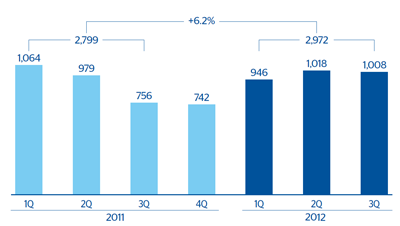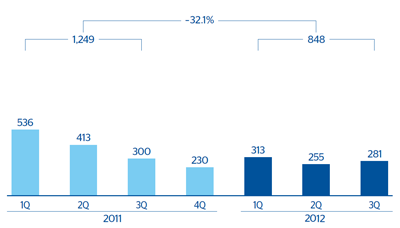Spain highlights in the third quarter
- Consolidation of Unnim.
- Positive performance of customer deposits.
- Good price management and strict cost control boost operating income.
- The increase in provisions enables BBVA to meet 2/3 of the RDL 02/2012 and 18/2012 requirements.
Industry Trends
In the third quarter of 2012, the commercial activity of Spanish credit institutions took place in a very difficult environment marked by:
- Greater uncertainty and weak economic growth.
- The debt crisis in Europe and difficulties in accessing the international wholesale finance markets. Financial tension that kept the markets practically closed and increased dependence on finance from the ECB, which at the end of September had reached the figure of €378 billion.
- High volatility on the financial markets.
With respect to the Spanish financial system, macroeconomic weakness and the necessary debt deleveraging process in the Spanish economy has led to a significant stagnation in credit demand. This is limiting growth in volumes and had a negative effect on the NPA ratio, which at the end of August stood at 10.5% for Spain’s financial system as a whole. Against this backdrop, savings become a key element in the management of the business.
The third quarter was a key moment in terms of progress in the process of restructuring in the industry. In September the conclusions of the bottom-up exercise carried out by Oliver Wyman were made public. The results of the stress tests once more showed the disparity within the Spanish financial system, with a core of strong banks and vulnerability limited to a specific part of the industry. This clear distinction between banks will make restructuring easier. The work by Oliver Wyman represents a decisive step in recovering market confidence in the Spanish financial system, and eases doubts about the transparency and valuation of bank assets. It marks the end of one of the final phases of restructuring which, once completed, will lead to a financial system with fewer but sounder banks. As was already mentioned at the time the top-down analysis was published in June, this new Oliver Wyman exercise confirms that BBVA will not need additional capital, even in the most adverse macroeconomic scenario, thanks to the recurrence and soundness of its business model. It clearly shows the strength of the Group’s model in situations of extreme difficulty.
Finally, with respect to BBVA in Spain, the acquisition of 100% of the capital stock of Unnim Banc, S.A. was completed in the quarter. As a result, the Group’s financial statements as of 30-Sep-2012 already include the Unnim accounts from July 27. The comments below include the figures for the Catalan bank, unless otherwise indicated. The integration of Unnim barely has an impact on the earnings in the area. It contributes a loan book of €18 billion, 25% of which is regulated by an asset protection scheme (EPA), and includes customer funds of around €11 billion. However, it does negatively affect the Group’s NPA ratio.


